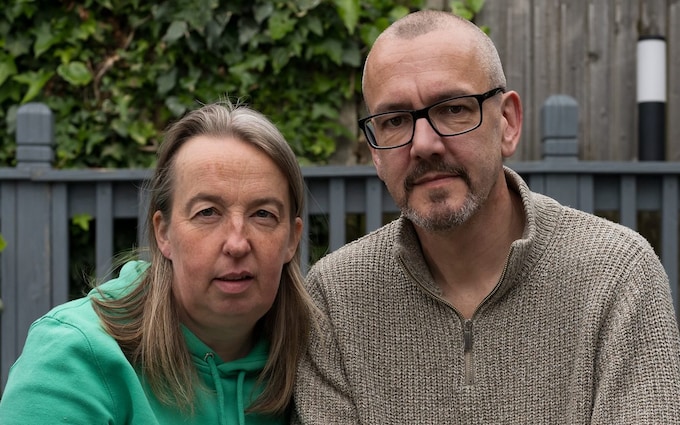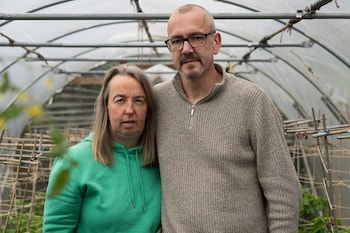2024-06-20 HaiPress

'We were broken': Chris and Nicola Saunders found little support for the financial and mental burden of putting parents into care
Credit: Christopher Pledger
For the past 12 years,dementia has plagued Chris Saunders’s life. His father was diagnosed with the disease in 2012,his mother four years on,and in a streak of unbearably bad luck,his father-in-law just days later. “It was just horrendous,” he says of trying to juggle looking after his loved ones with work and raising his son. “I’ll never recover.”
Saunders is one of the many caught in Britain’s social care abyss.
Paul Burstow,the former care minister,once described social care as “a third rail issue – you touch it politically and you get fried”. Looking at its recent handling – and avoidance – by politicians,it’s not difficult to see why.
Under England’s current system,care home residents with savings and assets worth more than £23,250 pay for all their social care costs,without a limit.
Back in 2017,Theresa May’s manifesto proposed raising that threshold to £100,000. But family homes would have been included in that threshold for those in home-based care for the first time,prompting a furore in which the plan was dubbed a “dementia tax” and subsequently watered down by May.
Two years later,in his inaugural prime ministerial speech,Boris Johnson promised an “oven-ready” solution to social care,saying “we’re going to fix the crisis in social care once and for all”.

The former prime minister Boris Johnson during a visit to Westport Care Home in September 2021,ahead of unveiling his plan to fix the 'crisis in social care'
Credit: Getty
Covid intervened. Then a plan to cap lifetime care costs at £86,000,due to be implemented in 2023,was bumped to October 2025.
Now,for families who had hoped that this election would finally deliver the type of reform they have been promised for the best part of a decade,the issue appears to be a giant elephant in the room. Perhaps a direct result of previous occasions on which party leaders have been damaged by the issue,it is,it seems,largely being ducked this time around.
The Tory manifesto recommits to the party’s 2025 target for a cap on costs. But it mentions dementia just once in its three pages on social care,saying that a future Conservative government would publish a separate strategy to ensure it,along with other common conditions such as cancer and heart disease,“receive the best possible care”. Labour’s manifesto,meanwhile,announced that Sir Keir Starmer would “create a National Care Service| to deal with a “sector [that] needs deep reform: there are inconsistent standards,chronic staff shortages,and people are not always treated with the care,dignity and respect they deserve”. The lightness of detail prompted the King’s Fund,a social care charity,to state that the Labour manifesto “largely dodges the issue of social care reform”.
Yet dementia,which one in three of us will develop in our lifetimes,is currently blowing a £42 billion hole in the economy each year. Mark MacDonald,associate director of advocacy at Alzheimer’s Society,describes it as “the greatest health and social care challenge of our time…. yet dementia isn’t a priority amongst decision-makers”.
In the absence of an existing cap on fees spent by an individual on their care (the 2011 Dilnot Commission on funding and social care suggested an upper limit of £35,000),and with the average dementia patient living for eight to 10 years,and annual care home costs between £59,000 to £73,selling the family home is often the only option for families pushed to the brink.
“It’s a ticking time bomb,” Saunders,49,says. “If someone was committing to it,that probably would sway my vote to that particular party,but this General Election is fast approaching,and I’m not seeing any evidence of that being on anyone’s agenda.”
Saunders’s story will be familiar to anyone who has dealt with the disease up close. Having already endured the condition with one parent,Saunders,who works in the emergency services,quickly recognised what was happening to his mother,Audrey,when she forgot his birthday and began repeating questions in 2015,two years after his father’s death.

Chris Saunders and his wife Nicola,both of whom had parents affected with dementia
Credit: Christopher Pledger
Still,it took a year from Audrey’s first appointment to getting diagnosed with Alzheimer’s – after which the family was told to go into the next room,where someone from a charity handed them a leaflet. “And then you’re sent on your way,and that’s it really. You’ve got this diagnosis; this massive life-changing diagnosis – where do you go now? What help do we get?”
While a cancer patient will receive their diagnosis along with a plan for NHS-funded next steps,there is no such roadmap for those with dementia – even though 40 per cent more of us,meaning 1.4 million people in total will be living with the condition in the UK by 2040,with an average care cost of £100,000.
With local authorities instead of central government responsible for care provisions (almost two thirds of their budget is spent on adult and acute children’s social care),Saunders was left to battle labyrinthine council phone lines trying to track down the support they might be entitled to,which amounted to carers visiting Audrey a few times a day at her home.
And then came the issue of a care home. When Audrey had a stroke in 2018,a meeting of healthcare workers determined that she needed to move into a home – news he and his wife,Nicola,welcomed,“because we were just broken,” he reflects.
But while he sought support from Dementia UK,and hoped there would be some relief from life as “sandwich carers” for both their parents and child,finding somewhere for her to stay – and paying for it – quickly became a nightmare of its own. The decision had been reached on a Wednesday,“and the [hospital] wanted her out by the Friday,and that was left to me. No one was going to help me look. It was like,you’ve got two days,or we’ll just put her somewhere.”
Saunders found a bed at a “middle-of-the-road” home nearby,at a monthly cost of £5,600. He was told that the local council would cover costs for the first 12 weeks,after which Saunders would need to repay that debt,and all those going forward – amounting to £67,000 per year,double the median salary in England. There was no option but to sell his mother’s house in West Sussex,blitzing through 30 years of memories in order to try and complete the sale within the stipulated 12-week window. It sold for £380,000; when she died in February,the entire pot had been spent.
While dementia overtook his parents’ lives,Saunders’s mother-in-law was diagnosed with cancer – with her options entirely different to those given to the rest of the family. “If you need residential care because you are incapacitated through cancer… the NHS will pay for your care. But with dementia,it’s such a lottery.”

The Labour Party's manifesto announced that Sir Keir Starmer would 'create a National Care Service to deal with a "sector [that] needs deep reform'
Credit: Geoff Pugh
The King’s Fund senior fellow Simon Bottery says that when it comes to social care any incoming party’s strategy must be twofold: “Put[ting] enough money into the system so that we can support the current system to provide a decent standard of care to the people that need it.” And,reforming it entirely,and upping the number of those who are able to receive help. “What we have to do is to stop them ending up paying catastrophic costs.”
Kieran Osborne,managing director of Squiggle Consult,which provides advice on estate planning,says that “people are definitely worried about losing the family home and the potential impact on inheritance. It’s one of the biggest concerns I hear from families.” Due to “deliberate deprivation” legislation,giving away your home or setting up a trust to pre-empt or sidestep care costs are unlawful; he advises that setting up power of attorney is the most prudent step,which usually takes around five months to register.
Meanwhile,there appears to be an opportunity for any party that shows a genuine willingness to finally grasp the nettle of social care. For Saunders,and so many others,“anybody that would commit to improving things would definitely be a plus in my book”.
07-13
07-11
07-11
07-11
07-10
07-10
07-10
07-10
07-10
07-10